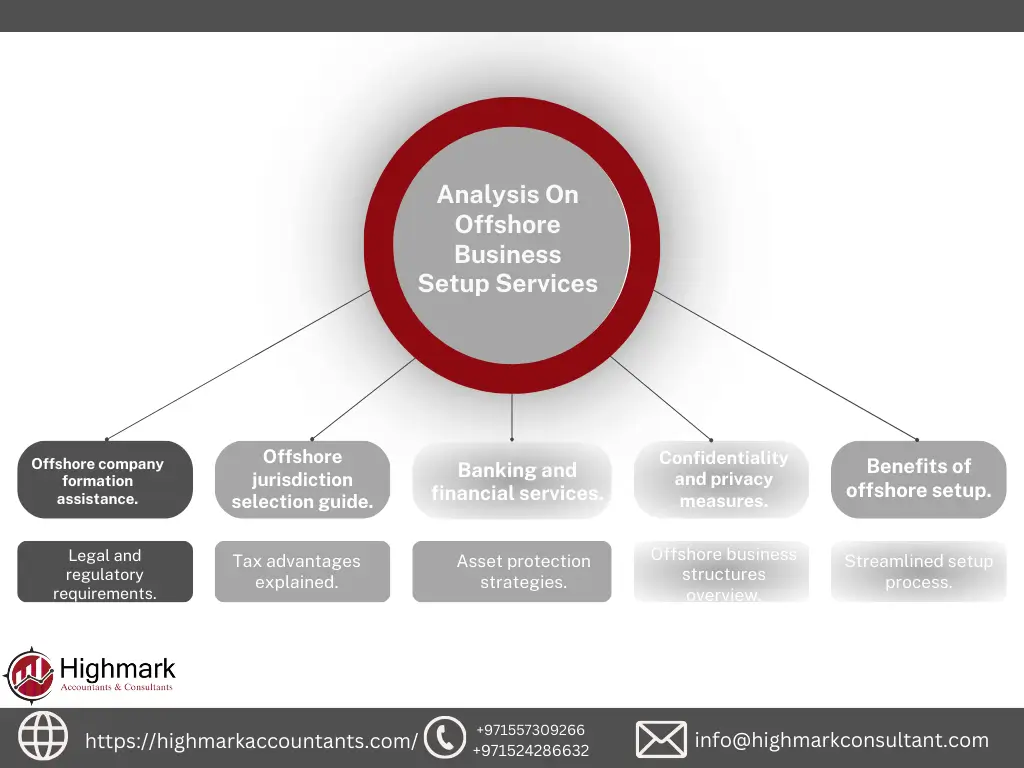Demystifying Offshore Firm Formations: Just How They Run and What to Expect
Offshore company formations can seem complex and enigmatic. Offshore Company Formations. These entities, frequently established for tax advantages and privacy, operate under distinct lawful structures. Business owners might locate themselves maneuvering through a maze of regulations and conformity requirements. Comprehending the intricacies is important for success. What are the genuine advantages? What are the prospective pitfalls? A closer assessment reveals the nuances that could impact decision-making substantially
Recognizing Offshore Companies: Kinds and definitions
Offshore business are entities developed in a jurisdiction beyond an individual's or service's primary country of residence, frequently for objectives associated with tax obligation optimization, property security, or regulatory advantages. These firms can take various kinds, including limited responsibility business (LLCs), worldwide company firms (IBCs), and offshore trust funds. Each type offers details features and attract different requirements.
Limited responsibility companies offer owners with protection from individual liability, while international business firms are popular for their flexibility and very little coverage requirements. Offshore trust funds, on the other hand, are utilized mainly for estate preparation and asset protection.
The option of territory significantly affects the company's operations, as some locations use extra favorable legal structures and personal privacy protections. Offshore Company Formations. Understanding the distinctions between these types is vital for people and services taking into consideration offshore structures, as each choice carries various effects for governance and conformity
The Advantages of Developing an Offshore Company
Developing an overseas business can supply numerous benefits, especially for those seeking to enhance their economic methods and secure their assets. One considerable advantage is tax optimization; lots of territories offer favorable tax prices or exceptions, enabling businesses to retain more earnings. In addition, overseas firms can supply a layer of personal privacy, shielding the identifications of proprietors and investors from public analysis.
Another benefit is property defense. By placing assets in an offshore entity, people can guard their wealth from prospective legal claims or political instability in their home nations. This framework additionally helps with global business operations, enabling simpler access to worldwide markets and varied clients.
The establishment of an overseas business can improve trustworthiness and prestige, appealing to customers who value worldwide service practices. Overall, these benefits make overseas company formations an attractive option for individuals and organizations going for monetary development and security.
Key Factors To Consider Prior To Creating an Offshore Entity
Prior to forming an offshore entity, numerous important factors must be analyzed. Lawful compliance needs, tax obligation effects and advantages, in addition to jurisdiction selection, play a considerable function in the decision-making procedure. Comprehending these considerations can help organizations and people browse the intricacies of offshore company formations efficiently.

Lawful Compliance Needs
When considering the development of an overseas entity, recognizing legal conformity requirements is important to assure adherence to both regional and global legislations. Potential local business owner need to acquaint themselves with regulations governing firm registration, reporting commitments, and operational requirements in the chosen jurisdiction. This consists of validating the legal needs for shareholders and supervisors, in addition to making certain conformity with anti-money laundering (AML) and know-your-customer (KYC) guidelines. Furthermore, organizations must stay mindful of any kind of licensing needs certain to their industry. Engaging local lawful and economists can give valuable insights, ensuring that all essential paperwork is prepared and sent properly. Ultimately, thorough knowledge of legal conformity helps minimize dangers and fosters a lasting overseas procedure.
Tax Obligation Ramifications and Benefits
Many entrepreneur think about the tax obligation effects and benefits of forming an overseas entity as an important consider their decision-making procedure. Offshore companies can supply significant tax obligation benefits, such as reduced business tax obligation rates, exemption from specific neighborhood tax obligations, and the capacity to delay taxes on foreign earnings. These advantages can cause enhanced profitability and cash money flow, making offshore structures appealing for worldwide organization operations. In addition, the potential for tax obligation treaties might further lessen tax liabilities. However, it is necessary for entrepreneur to recognize the complexities involved, consisting of compliance with both international and local tax obligation policies. Engaging with tax professionals is a good idea to browse these complexities efficiently and ensure excellent tax planning approaches.
Jurisdiction Option Variables
What factors should one think about when picking a jurisdiction for overseas business development? Secret considerations include tax obligation efficiency, regulatory setting, and political stability. Jurisdictions with beneficial tax routines can greatly influence productivity. The regulatory landscape should supply adaptability and simplicity of conformity, enabling reliable business operations. Political stability is essential, as it ensures the security of properties and connection of procedures. Additionally, the credibility of the territory can affect client trust and service partnerships. Ease of access to financial solutions and the accessibility of expert support services are also crucial. Recognizing regional regulations regarding possession, coverage, and personal privacy needs is necessary to establish that the offshore entity aligns with the service owner's objectives and lawful obligations.
Possession The Refine of Setting Up an Offshore Firm
Establishing an offshore company involves a collection of calculated steps that require mindful preparation and compliance with global laws. An individual need to select an appropriate jurisdiction that straightens with their company purposes and offers desirable tax advantages. Following jurisdiction choice, the next action is to choose an one-of-a-kind firm name and prepare the required documents, including posts of incorporation and investor arrangements.
Once the paperwork prepares, it must be submitted to the pertinent authorities in addition to the needed costs. After approval, the firm will receive a certification of incorporation, formally developing its lawful existence. The private have to after that open up a business checking account to facilitate monetary purchases.
Keeping an overseas company entails adhering to ongoing conformity demands, such as yearly reporting and tax obligation commitments, which differ by jurisdiction. Comprehending each action is crucial for a successful overseas business formation.

Regulatory and legal Structure for Offshore Business
While developing an offshore firm can use considerable advantages, it is necessary to maneuver through the complicated lawful and regulative structure that governs such entities. Each jurisdiction has its own set of laws that determine every little thing from company development to taxation and compliance demands. These policies are created to protect against illegal activities, such as money laundering and tax evasion, and usually need comprehensive paperwork and transparency.
Crucial element of this framework include the need of designating regional directors, maintaining a licensed office, and sticking to annual coverage responsibilities. In addition, several territories impose specific licensing demands for particular company activities. Recognizing these lawful terms is essential for ensuring compliance and mitigating risks connected with fines or legal disputes. Engaging with lawful experts who specialize in overseas companies can aid in maneuvering via this detailed landscape, eventually helping with a effective and compliant offshore service procedure.
Common Misunderstandings Regarding Offshore Companies
Many individuals hold misunderstandings concerning offshore business, often relating them with tax obligation evasion and illegal tasks. However, it is very important to recognize that these entities can operate legitimately within a structure designed for legitimate service techniques. Making clear the legal standing of overseas business can help eliminate these misconceptions and promote an extra exact understanding of their objective.
Tax Evasion Myths
Regardless of the expanding appeal of overseas firms, misconceptions concerning their use for tax obligation evasion linger. Many individuals wrongly think that developing an overseas entity is only a see this website method to stay clear Web Site of taxes. Nonetheless, overseas companies are usually used for legit functions, such as possession defense, international business development, and investment diversification. The perception that all overseas tasks equate to illicit tax obligation evasion forgets the complexities of worldwide tax obligation regulations and compliance needs. Furthermore, the vast majority of overseas territories have actually carried out actions to combat tax obligation evasion, promoting transparency and info exchange. This mischaracterization can hinder legitimate companies and financiers from discovering the possible advantages of overseas firm formations while bolstering a negative stigma surrounding these entities.
Legal Condition Clarified
The legal status of offshore companies is commonly misconstrued, leading to a variety of misconceptions. Several believe these entities operate in a lawful grey location, presuming they are inherently unlawful or unethical. In truth, offshore companies are reputable organizations created under the legislations of particular territories, created for different reasons, consisting of property security and market development. An additional usual mistaken belief is that offshore companies evade tax obligations entirely; nevertheless, they are subject to the laws and tax responsibilities of their home nations. Additionally, some individuals believe that overseas companies can be conveniently manipulated for cash laundering or illegal activities. While misuse can take place, the majority of territories implement strict conformity and openness laws to minimize such threats, guaranteeing that offshore companies operate within legal frameworks.

Taking care of and Running Your Offshore Firm Successfully
Successfully managing and operating an overseas firm requires a critical method that balances conformity with regional regulations and the search of organization goals. Successful offshore management entails understanding the jurisdiction's tax legislations, reporting requirements, and functional laws. Using neighborhood experts, such as accounting professionals and legal consultants, can offer indispensable understandings into passing through these complexities.
Additionally, establishing clear interaction channels and operational protocols is vital for keeping effectiveness. Making use of innovation for project management and collaboration can enhance performance, while routine efficiency assesses assurance positioning with tactical goals.
Preserving robust financial documents is vital, as transparency fosters depend on with stakeholders and complies with global requirements. Being adaptable to adjustments look at this now in regulation or market problems allows offshore business to pivot successfully, ensuring long-lasting sustainability and growth. By sticking to these concepts, service proprietors can make best use of the benefits of their offshore ventures while mitigating risks.
Often Asked Questions
Just how much Does It Expense to Preserve an Offshore Business Each Year?
The cost to maintain an overseas business every year varies considerably, usually varying from $1,000 to $5,000, relying on territory, solutions called for, and compliance responsibilities. It is necessary to think about extra charges for details needs.
Can I Open Up a Financial Institution Account for My Offshore Firm From Another Location?
Opening a savings account for an offshore firm from another location is usually possible. However, requirements might vary by territory, frequently requiring paperwork and verification processes, which can make complex the remote application experience for people.
Are There Details Countries Known for Easier Offshore Business Formations?
Specific countries, such as Belize, Seychelles, and the British Virgin Islands, are renowned for their favorable regulations and streamlined processes concerning overseas company formations, attracting entrepreneurs seeking efficiency and confidentiality in organization procedures.
What Types of Organizations Are Best Suited for Offshore Firms?
Certain companies, such as investment, ecommerce, and consultancy firms, typically gain from offshore companies as a result of tax obligation advantages, personal privacy, and regulative flexibility - Offshore Company Formations. These entities commonly prosper in territories that promote beneficial company atmospheres
How Can I Guarantee Compliance With Local Laws When Operating Offshore?
To guarantee compliance with neighborhood regulations when operating offshore, it is crucial to engage legal specialists, perform detailed research on territory guidelines, and maintain clear economic documents, thereby reducing dangers related to non-compliance.
